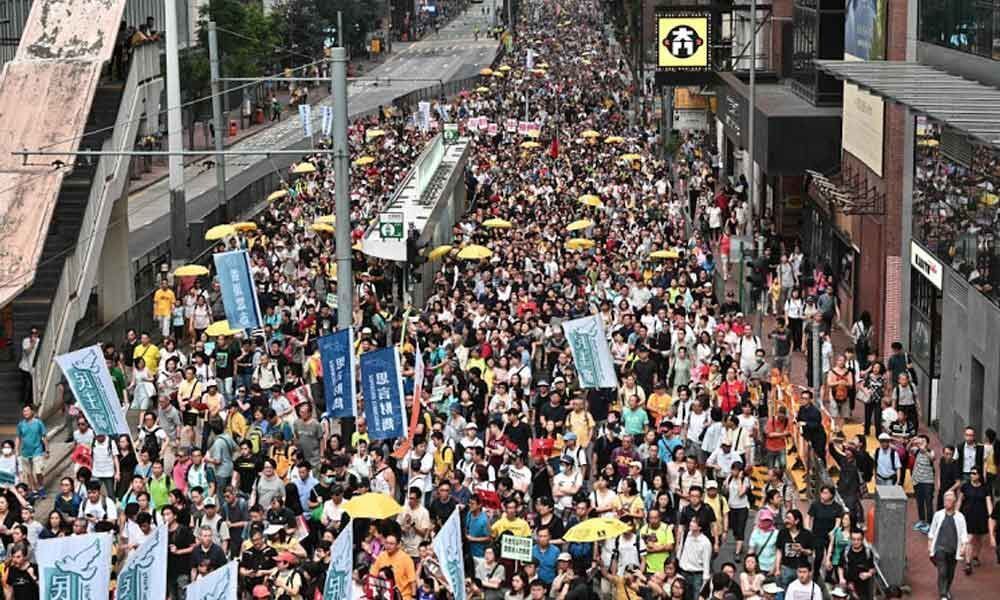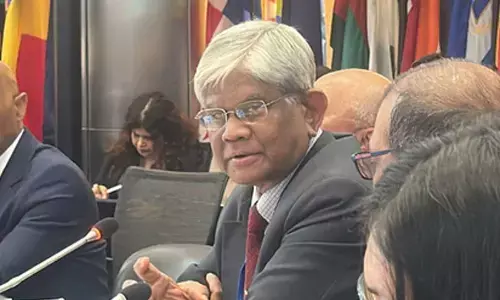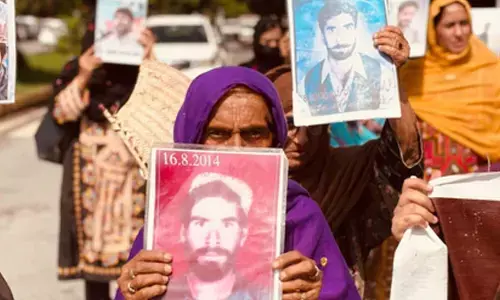Huge Hong Kong protest against China extradition law

‘This bill will not just affect Hong Kong's reputation as an international finance centre, but also our judicial system,’ a student said.
Hong Kong: Huge protest crowds thronged Hong Kong on Sunday as anger swells over plans to allow extradition to China, a proposal that has sparked the biggest public backlash against the city's pro-Beijing leadership in years.
Tens of thousands of people marched in blazing summer heat through the cramped streets of the financial hub's main island in a noisy, colourful demonstration calling on the government to scrap its planned extradition law.
The city's pro-Beijing leaders are pushing a bill through the legislature that would allow extraditions to any jurisdiction with which it does not already have a treaty -- including mainland China for the first time.
Coffee shop owner Marco Ng said he was closing his store to join the march. "Our city matters more than our business," the 26-year-old told AFP. "If we don't speak out, then there's no way that the government will listen to our concerns." "The people's voices are not being heard," added 18-year-old student Ivan Wong. "This bill will not just affect Hong Kong's reputation as an international finance centre, but also our judicial system. That has an impact on my future."
The proposed law has sparked an opposition that unites a wide demographic, setting off the largest demonstrations since 2014 pro-democracy protests brought parts of the city to a standstill for two months. In recent weeks lawyers have held sombre marches dressed in black, anonymous senior judges have given critical media interviews and the city's two main legal groups -- the Law Society and the Bar Association -- have urged a rethink.
Business figures are also rattled with multiple chambers of commerce and commercial groups expressing alarm, adding to criticism from the United States, Canada, former colonial power Britain and many European governments.
Online petitions have been gathered by groups as diverse as stay-at-home mums, students, nurses and horse racing fans. Hong Kong's leaders, who are not popularly elected, say the law is needed to plug loopholes and stop the city being a bolthole for mainland fugitives.
They say dissidents and critics will not be extradited and have urged quick passage of the bill in order to extradite a Hong Kong man who is wanted in Taiwan for murdering his girlfriend. But critics fear the law would entangle people in China's opaque and politicised court system and say the government is using the Taiwan case as a Trojan Horse.
The proposed law has been fast-tracked through the city's legislature which is dominated by pro-Beijing members and on Wednesday it will receive its second reading. The government says it plans to have the law on the statute book by late July. Previous sessions in parliament have descended into chaos with rival lawmakers scuffling.
Sunday's march was seen by organisers as an attempt to showcase how wide the opposition to the bill is ahead of the second reading. The backlash creates a headache for the city's appointed leader Carrie Lam who has staked her political reputation on the bill passing.
Pushing through the legislation could spark more protests or even a return to the unrest of 2014 -- but backtracking might embolden opponents and anger Beijing. Several senior Communist Party leaders in China have voiced support for the bill.
In recent weeks Lam's administration has made some key concessions. They have removed nine economic crimes from a list of extraditable offences and said only crimes that carry seven years or more in jail will be considered, up from three.
Requests will only be considered from China's top prosecuting authority. Those steps have received a cautious welcome from some business groups, but others have seized on the concessions as tacit admission that China's courts are not impartial.
Many protesters on Sunday said they no longer trust the Hong Kong government to stick to its commitments that Beijing critics would not one day end up getting sent to the mainland. "This government is not elected ... they are only acting for those who gave them power," Johnny Yuen, a 57-year-old construction worker, said.
"Dignity is something we are going to have to fight for ourselves." Suspicion of China was worsened by a series of high profile disappearances of people who later appeared in mainland detention, including a group of dissident publishers and a billionaire who disappeared from a top hotel.
Meanwhile trust in the city's leadership to withstand political pressure from Beijing has fallen further after the failure of the 2014 protests to win any concessions, the imprisonment of protest leaders and the banning of some critical lawmakers from taking office or standing for election.


















